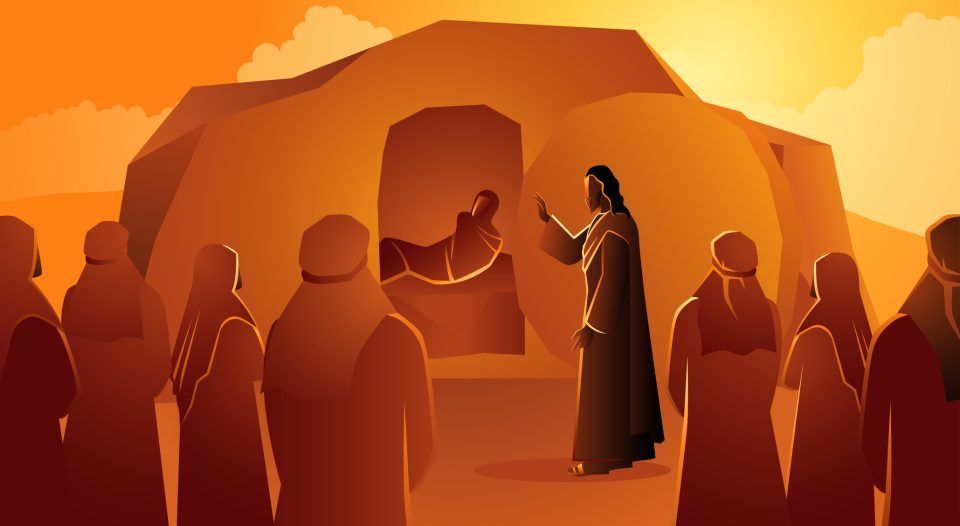Lectionary for March 26, 2023
Fifth Sunday in Lent
Ezekiel 37:1-14; Psalm 130;
Romans 8:6-11; John 11:1-45
Shortly after we were married, the sibling of one of my wife’s friends died suddenly at a tragically young age. Up to that point, I don’t think I’d been that close to the death of someone I knew. My wife was bereft. We cried and prayed together for a resurrection like Lazarus’, but it didn’t happen. While that outcome isn’t surprising, it’s still profoundly painful many years later. There’s no upshot—I’m not going to say that it was suddenly OK, because it wasn’t and isn’t. Death is horrible, and that’s why it’s one of the things that Jesus came to free us from. The coming good news—which isn’t here entirely yet—is that Jesus does come to free us from sin and death, and much more besides. The lectionary texts help us see the fullness of the eventual good news amid death and sadness.
Ezekiel 37 is a well-known text: the valley of dry bones. I remember vividly, and somewhat bitterly, missing a point on a confirmation quiz about 30 years ago that asked the genre of this text—was it a prophetic vision or a narrative history? I said narrative history because it wasn’t described as a vision in the text (unlike, say, Ezekiel 40), and it was counted incorrect.
Whatever the interpretation, God whisks Ezekiel away to a valley full of bones. Perhaps an army has been slaughtered? Ezekiel prophesied repeatedly over the bones, and they were knit together, enfleshed and then inspired (literally) to come to life. Rather than being a prophesy of individual or even corporate human resurrection, however, the explanation that God gives Ezekiel points to national resurrection. Even after Judah was conquered and exiled, God would bring the exiles back and constitute Persian Yehud and eventually Judea. So we can read this text as pointing to resurrection, but we must also see it as it is presented—it’s about national preservation and reconstitution.
As a quick aside, lots of passages in the Hebrew Bible point to resurrection and victory over various kinds of death. Ancient interpreters read Deuteronomy 32:39, “See now that I am he! There is no god besides me. I put to death, and I bring to life …,” as God pointing to the eventual, general resurrection. Job seems to speak of human resurrection when he proclaims, “Though after my skin and worms destroy my body, yet in my flesh shall I see God …” (Job 19:25-27). Elijah (1 Kings 17:17-24) and Elisha (2 Kings 4:32-37) at least temporarily resurrect humans, reprieves specifically meant to comfort grieving mothers.
Martha confesses to believing in the coming resurrection of all the dead. But Jesus is going to do something else here with her brother.
Centuries later, we have the beloved story of Jesus resurrecting Lazarus. It’s difficult for me to grasp that Jesus intentionally delays coming to Judea in order to allow Lazarus time to die. Certainly, Jesus mourns and weeps at the suffering of his friends (and benefactors) Martha and Mary because their brother has died. Martha confesses to believing in the coming resurrection of all the dead. But Jesus is going to do something else here with her brother. After four days in a grave, and presumably advanced decay, Jesus calls Lazarus out of the tomb. The dead man walks again, and he came to eat and celebrate with his friend and savior. Many who saw this resurrection came to believe in Jesus (John 11:45).
The good news is that God always wants to defeat death! In related [good] news, God wants to defeat all kinds of death: the death of dreams, the death of people, the death of hopes, the deaths of family members, the death of community. Jesus willingly submitted to a horrific execution and death on a Roman cross in order to free the world of sin and death. And while we start to look forward to celebrating Jesus’ victory over death, we live in a sort of in-between time that is neither fully Lent nor fully Resurrection Day. In the meantime, we celebrate God’s power over death, mourn how we still experience death, and look forward to the day when death shall cease and God will wipe away every tear from our eyes (Revelation 21:4).




